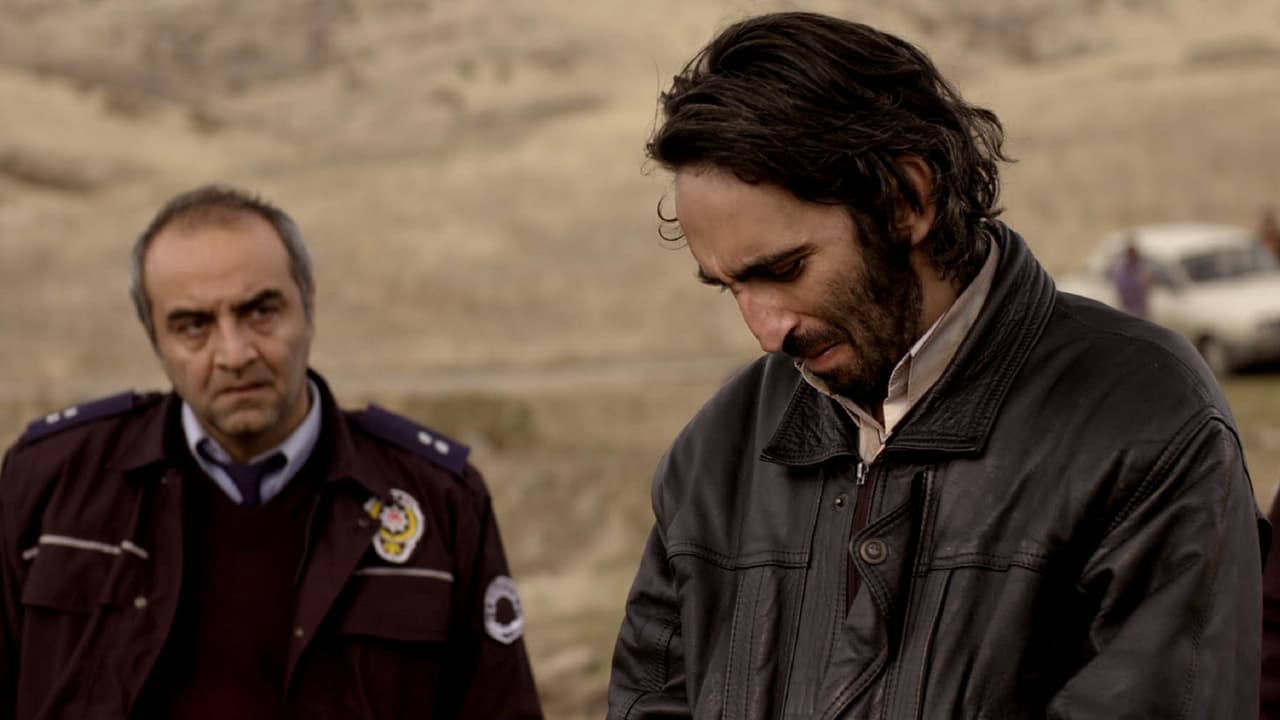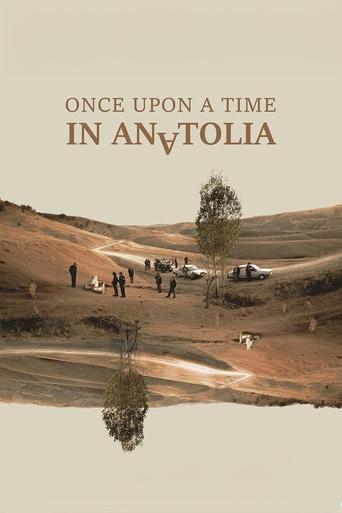

At just over two and a half hours, this fourth effort by the directorial minimalist master, Nuri Ceylan, will probably deter many viewers. From the fade-in, however, fans of Ceylan will be immediately drawn into - once again almost voyeuristically through a dirty glass window as the scene focuses - the ordinary lives of three men sharing a meal, drinks, conversation and jokes at a run-down garage somewhere in Anatolia. Voices are so muffled we can't hear what is being said. We don't know who these men are.Heavy traffic crisscrosses the scene, occasionally obscuring the view; outside, a dog barks. One of the men picks up food and, as the scene widens to show the darkly brooding night sky crashing with thunder (almost a Ceylan trademark in movies), he takes the food to the dog, gives it a pat, looks around and up, and returns to his meal and the others. Fade to black.Next fade-in (next day? next week? who knows?) at dusk, we see on the horizon, from a high vantage-point, three sets of headlights which eventually stop nearby to disgorge many police and others, perhaps a dozen men in all. In the dimming light, we can just see one of the men is handcuffed. None of the faces are clearly seen. As the story now gets under way, we discover that two of the men are somehow involved in the death of another person, and efforts are now in progress to find a buried body.So ... we settle back comfortably to watch how director Ceylan unravels the mystery for us: the who, what, where, how and why of all good mysteries. All well and good, except for one thing: the real story here is actually not about finding a body somewhere in these Anatolian hills, nor who it is, how and why the death happened, or even when. The real story is certainly about a death, though - an almost unbelievably poignant, pointless death which is revealed and discussed between two of the officials as the whole search party continues to travel through the night, from place to place, up hill and down dale, hour after hour, until eventually, the accused man - who looks familiar - correctly pinpoints where the corpse lies. From there, the body's taken to the local hospital for autopsy and official report. The two accused are taken to the local lockup. By this time, and no longer comfortable, we don't really care much about that issue, that sordid little side affair, whatever it was about. What's more important is the outcome between those two officials who wrestled, quietly vehemently, emotionally and psychologically about guilt, forgiveness and justice through much of the night and into the day. And all of which shows again the creativity and skill of Nuri Ceylan, his actors and his production team in creeping into viewers' minds so effectively. Again.The setting is bleakly appropriate, recalling landscape imagery we saw in No Country for Old Men (2007); but this one uses that type of vista for most of the time. Moreover, the two movies each have no music soundtrack which, for this viewer, is always a welcome omission. The script and acting are simply superb.Nuri Ceylan (and don't forget his wife, Ebru, who helps write and produce) is, IMHO, one of the best directors on this planet; arguably the best I've seen at mood-setting static and long takes, and facial close-ups; and, along with Ebru, brings some of the most innovative stories I've seen in all my 70 viewing years. Together, (if you'll excuse the hyperbole) they're the Turkish Dream Team of Cinema. Long may they continue to develop and produce the highest quality cinematic experience.Recommended for all to see. Give this a well-deserved nine.July 18, 2016.
... View MoreI came across this movie after a lot of research and spending a lot of time. When i read the reviews, the expectations were high. The movie started very well and built up a lot of expectations on what will unfold.Lot of time had passed and we were still on character building. The movie shows great attention to details on every scene for every character other than the accused I felt. Great cinematography and acting and thats it. I was hoping for a twist or something to happen next as it was thriller genre movie. The movie then just ends leaving everything open ended.
... View MoreAfter his latest feature WINTER SLEEP (2014) won Palme d'Or this year, there is no better timing to assess Nuri Bilge Ceylan's previous works, personally I was daunted by my first experience with his film, THREE MONKEYS (2008, 6/10), so until now I dare to stride a second step, here comes his 2011 crime-drama. The opening scene is a staunch fixed shot with its focus shifting from blur to clarity (which is a regular ploy for Ceylan), we see three men is inside a house and chatting casually, after hearing a dog barking outside, one opens the door and feeds the dog, later we will know, he is the dead victim Yasar and the other two are suspects. Then sliding the opening credits, but this is not a conventional whodunit and don't expect Ceylan to expound on the nuts and bolts of the case, instantly the film embarks on its one-night and one-day account of how a convoy led by Prosecutor Nusret (Birsel) and Commissar Naci (Erdogan) locate the corpse with the confession of one of the said suspects Kenan (Tanis), and the subsequent autopsy conducts by Doctor Cemal (Uzuner). The story is thick with ideas pertinent to the milieu of ethnic rural Turkey, the Anatolian part at least, as well as philosophical guidelines under a sweeping overtone about morality, innocence and compassion (for example, the falsehood in autopsy near the end, a drop of blood stain is a brilliant finishing touch to underlie the ambiguity, plus many symbolist additions are spread all over the film). As the search rambles on and sifted through their informal tête-à-têtes or implications suggested from random chitchats among other sidekicks in the team, audience will grasp the abiding burdens overpowering all 3 main characters, the prosecutor (his wife's mysterious self-prophetic death), the commissar (the beaten career fatigue with a sick boy in the family to tend) and the doctor (a failed marriage scars his life). But it is not all solemn and depressing, occasionally, dark humour crops up at the most inappropriate crunch, say, the Clark Gable remark. These characters are deeply felt by actors, who constitute a magnificent ensemble including many lesser players, the two-handers between Uzuner and Birsel (there are some fungal infection on his cheeks, quite intrusive) are certainly among the best of the year when several bouts of their calmly contradictory theories about the aforementioned destined death beguilingly play out with etiquette and composure. As a matter of course, in Ceylan's world, his outstanding visual scope is astonishing and even breathtaking in some unyielding long takes of Anatolia's topographic magnificence. Also, leaving blank is a philosophy roots deeply in Ceylan's cinema world, he offers viewers time to contemplate what they are watching and hearing, therefore, the total running time is stretched out, but in a very good way, if we have time, why don't we sit down and enjoy a decent meal with intervals for rumination instead of gulping down fast food with scare nutrients and barren aftertaste? Which is a more reasonable and salubrious way for avid cinema-goers.
... View MoreMore Chekhov than CSI, the movie follows a group of men - a commissar, a prosecutor, a doctor, a few cops, a confessed murderer and his accomplice - through a long night as they travel in rural Anatolia, searching for the location of the victim's buried body.Introspective and slow-paced, Once Upon a Time in Anatolia plays like an anti-detective story. Details of the case are sketchy, the suspects' recollections fuzzy; the story unfolds placing a much greater emphasis on characters. Both the cinematography and the actors' gaunt, tense faces capture the sense of dream-like tiredness and quiet desperation of people persisting in an exhausting, possibly useless task; a few voice-overs are largely unnecessary.Men are lonely and brooding; female figures pass by like visions or ghosts; truth proves to be disquieting, both in the main case and in a tale told by the prosecutor which slowly turns into a horrible revelation - significantly, the anecdote is straight out of a short story by Chekhov himself (The Examining Magistrate).7,5/10
... View More